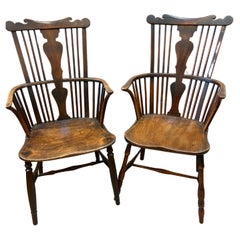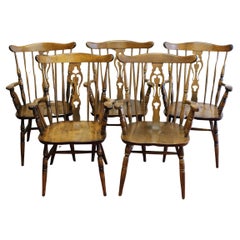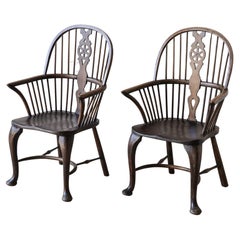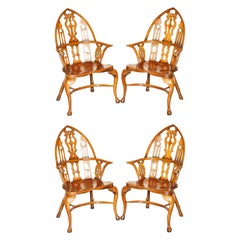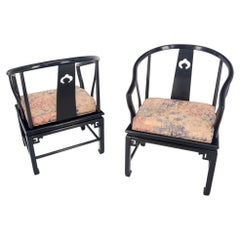Windsor Chairs
18th Century British George II Antique Windsor Chairs
Ash, Elm, Walnut
Late 20th Century British Country Windsor Chairs
Beech
18th Century English Antique Windsor Chairs
Elm
20th Century English Gothic Windsor Chairs
Elm, Yew
20th Century American Mid-Century Modern Windsor Chairs
Upholstery, Walnut
20th Century American Mid-Century Modern Windsor Chairs
Upholstery
19th Century American Victorian Antique Windsor Chairs
Oak
19th Century British Antique Windsor Chairs
Oak
20th Century English Gothic Windsor Chairs
Elm, Yew
Mid-19th Century European Victorian Antique Windsor Chairs
Oak
1950s Danish Mid-Century Modern Vintage Windsor Chairs
Walnut
Mid-20th Century Country Windsor Chairs
Elm
20th Century Japanese Mid-Century Modern Windsor Chairs
Birch
1760s English Country Antique Windsor Chairs
Ash, Elm
20th Century French Mid-Century Modern Windsor Chairs
Metal
20th Century Windsor Chairs
Metal
20th Century French French Provincial Windsor Chairs
Metal, Wrought Iron
Mid-20th Century American Mid-Century Modern Windsor Chairs
Cane, Walnut
1980s Vintage Windsor Chairs
Wood
1820s Great Britain (UK) George IV Antique Windsor Chairs
Elm, Yew
19th Century British Victorian Antique Windsor Chairs
Chestnut
18th Century Georgian Antique Windsor Chairs
Elm
19th Century English Victorian Antique Windsor Chairs
Yew
19th Century American Victorian Antique Windsor Chairs
Elm
1930s Danish Scandinavian Modern Vintage Windsor Chairs
Leather, Oak
19th Century British Early Victorian Antique Windsor Chairs
Ash
Late 20th Century American British Colonial Windsor Chairs
Hardwood, Paint
Early 19th Century English Regency Antique Windsor Chairs
Elm, Yew
Late 19th Century American Victorian Antique Windsor Chairs
Oak
Late 18th Century American Antique Windsor Chairs
Wood
1830s American American Colonial Antique Windsor Chairs
Wood, Paint
Early 19th Century American American Colonial Antique Windsor Chairs
Maple, Paint
Late 19th Century Antique Windsor Chairs
Upholstery, Walnut
19th Century English Antique Windsor Chairs
Oak
Mid-19th Century English Antique Windsor Chairs
Elm, Yew
Early 1700s Italian Gothic Antique Windsor Chairs
Leather, Wood
Mid-19th Century American Country Antique Windsor Chairs
Wood
Late 20th Century American Other Windsor Chairs
Oak
18th Century Antique Windsor Chairs
Ash, Elm
Mid-19th Century British Country Antique Windsor Chairs
Elm, Fruitwood, Yew
Early 19th Century Rustic Antique Windsor Chairs
Oak
18th Century English Antique Windsor Chairs
Yew
20th Century French Industrial Windsor Chairs
Metal
20th Century American Mid-Century Modern Windsor Chairs
Walnut
Late 20th Century Macedonian Mid-Century Modern Windsor Chairs
Faux Bamboo, Cherry
19th Century English George III Antique Windsor Chairs
Yew
18th Century English Antique Windsor Chairs
Elm, Yew
Late 20th Century Japanese Windsor Chairs
Oak
19th Century American Country Antique Windsor Chairs
Wood, Pine
Mid-20th Century American American Craftsman Windsor Chairs
Brass
Early 19th Century English Antique Windsor Chairs
Wood
Mid-20th Century American Mid-Century Modern Windsor Chairs
Maple
20th Century English Art Nouveau Windsor Chairs
Mahogany
18th Century English Antique Windsor Chairs
Wood
Late 20th Century American Arts and Crafts Windsor Chairs
Cherry
1790s English Antique Windsor Chairs
Elm
Early 20th Century British Late Victorian Windsor Chairs
Elm
Mid-19th Century American Other Antique Windsor Chairs
Wood
Late 19th Century English Antique Windsor Chairs
Oak
Mid-19th Century American Victorian Antique Windsor Chairs
Faux Bamboo, Maple
Vintage, New and Antique Windsor Chairs
Today, antique and vintage Windsor chairs serve as timeless, elegant seating no matter what your interior design preferences might be. Given their long history and versatility, they’re definitely among the chairs you should know when furnishing your new house or apartment.
The Windsor chair originated in the early 1700s in the English town of Windsor. Their bentwood back frames are assembled with slender wooden spindles that are plugged into drill holes in the sculpted seat, which was usually made of elm and slightly sunken or dish-shaped for the sitter’s comfort. The chairs have wooden legs that splay outward to provide stability, and unlike other chair designs, the back legs have no connection to the chair back. According to legend, the Windsor gained popularity after King George III took shelter in a cottage and was invited to sit on one. He was so charmed by the humble design that he had copies made for Windsor Castle.
With the arrival of the 1730s, Windsor chairs made their way to the American colonies. A handful of Windsor chairs are said to have appeared in Philadelphia by the late 1720s, owing to Pennsylvania lieutenant governor Patrick Gordon’s fondness for the seat. Colonial furniture makers sometimes painted their Windsor chairs, which were crafted from a variety of woods such as thick pine, ash or birch. The types of Windsor chairs made in America included chairs with the bentwood bow backs that characterized the English originals as well as other types of chair backs, such as rounded sack backs, backs with tall extensions and more.
Windsor style seating, which includes side chairs, rocking chairs and more, is synonymous with lightness, durability and comfort. These chairs were attractive for their portability and gracefully simple form, which rendered the furnishings versatile. Windsor chairs were frequently used in the gardens of 18th-century country homes, where tea would be served or musical entertainment took place for a modest-sized party. Today, Windsor chairs complement various furniture styles and are a practical seating choice whether you’re outfitting your entertainment room or seeking patio furniture for meals in the great outdoors.
Not all of us have the space for a sumptuous Chesterfield armchair or wingback chair — the adaptable, admirable Windsor chair, alternatively, makes for an ideal accent chair in your living room, while a Windsor bench is a surefire finishing touch to elevate any entryway or foyer. And whether you’re mixing and matching seats for the dining table or in the market for a more streamlined look, consider the Windsor chair for either plan. Find a collection of antique and vintage Windsor chairs on 1stDibs today.
